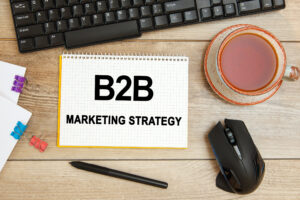
2025 is here, and the landscape of B2B marketing continues to evolve at breakneck speed. Rapid technological advancements, intense shifts in consumer behavior, and trends like personalization make it difficult for marketers to keep up. “As 2025 unfolds, the marketers who thrive will be the ones who adapt quickly, embrace innovation, and stay customer-focused,” says strategist, speaker, and author Eric Holtzclaw. “It’s not just about keeping up with trends—it’s about leading the way.” To drive continued success, it’s essential for businesses in all industries to future-proof their marketing strategies to adapt to these emerging trends and changes.
A Future-Proof Marketing Plan
According to business management expert Peter Drucker, “The best way to predict the future is to create it.” By taking a proactive approach to future-proofing your business, leaders can actively shape their paths rather than passively waiting for change. Here are some tips for marketers to ensure their B2B marketing plans remain relevant and effective in 2025 and beyond.
Create or Update Your Marketing Plan
If you don’t already have a marketing plan in place, now is the perfect time to create one. A documented strategy is foundational to marketing success. As such, every business needs a solid, actionable marketing plan. Whether you are starting from scratch or updating last year’s plan, this template walks you through eight steps to creating a strategic marketing plan.
It’s a Team Effort
Future-proofing your B2B marketing plan should not be a siloed effort. Involve cross-functional teams, such as sales, product development, technology, and customer service, in the planning process. Their perspectives can provide valuable insights and help identify potential areas for improvement or new opportunities. Encourage open communication and collaboration across departments. This companywide alignment will not only enhance your marketing efforts but also foster a unified approach to delivering exceptional customer service to clients.
Strike a Balance Between Traditional and Tech
A balanced marketing plan spans a variety of channels. Digital marketing offers precision targeting, real-time analytics, and cost efficiency. Yet, traditional methods like bylined articles, white papers, case studies, direct mail, and in-person events provide tangible, lasting brand impressions and credibility. An integrated approach ensures broader audience reach by appealing to tech-savvy consumers and those who prefer offline interactions. Additionally, leveraging varied channels creates multiple touchpoints, reinforcing brand messaging and enhancing customer engagement. By strategically combining digital innovation with time-tested traditional methods, businesses can maximize their marketing impact and drive sustainable growth. If you need inspiration, check out our Guide to B2B Marketing Essentials (a list of tactics starts on page 10).
Make Your Marketing Plan Adaptable
Marketers should have a written, solid marketing plan that’s directional, but also flexible enough to remain adaptable. Incorporate agility and adaptability by keeping initiatives to shorter timeframes, planning a few experiments each quarter, and allocating budget for rapid response efforts. Empower your marketing team to make data-driven decisions and shift gears quickly based on new opportunities or challenges.
Conduct Quarterly Reviews
One of the best, most effective ways to future-proof your marketing plan is to regularly re-evaluate what’s working and what’s not. Set aside time every quarter to thoroughly analyze your marketing performance across all channels and platforms. Look at the hard data on engagement, conversions, and ROI. But also talk to your sales team to get their qualitative feedback on what marketing strategies are driving the most valuable leads. Solicit input from other departments as well to ensure companywide support of initiatives. Use these insights to optimize ongoing efforts and adjust your planning for the next quarter.
Embrace Change
The marketing world is constantly shifting, and what works today may not be as effective tomorrow. Consumer preferences, technological advancements, and market dynamics are ever-changing. This means it’s essential to regularly review and adjust your marketing strategies. Be proactive in acquiring and leveraging new technologies. Failing to adapt can lead to stagnation and loss of growth. Instead, embrace change and see it as an opportunity to grow and succeed.
Reskill and Retrain When Needed
As marketing evolves, so must your team’s skills. Audit your current team’s capabilities to identify any gaps related to future needs. Provide training and development opportunities in areas like data analytics, content creation, and social media to get ahead of marketing trends. Consider outsourcing for specialized needs. Investing in a future-ready marketing team will propel your marketing plan forward more than any single campaign ever will.
Change Is Constant

In the dynamic world of B2B marketing, change is inevitable. As trends shift and audience expectations change, staying ahead requires continuous adaptation. Marketing trends, technologies, and tactics may evolve, but strong fundamentals will always be the key to long-term success. The foundation of any effective marketing plan starts with a deep understanding of your ideal customers—their needs, challenges, and goals. With this insight, you can craft customer-centric content that delivers real value and drives meaningful results. Ready to future-proof your marketing strategy for 2025? Let’s talk! Schedule a call with one of our experts today.
